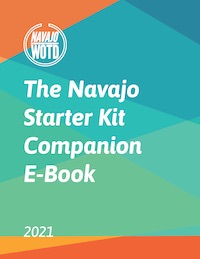hasht'e' nihénil
to save or set it aside
hush teh nih hyeh nil
This is an example of a Navajo colloquialism, and it translates somewhat to “I set it aside.”
The understanding behind this phrase is connected to money (béeso). In this sense, it means “I saved money.” This is a form that refers to something that was done and completed.
If you were to be in the process of saving money, you would need a verb form that is of the imperfective mode, which means something has begun but has yet to be completed.
This form is: hasht’e’ niheshnííł.
An example: Hooghan ła’ nahideeshnih biniiyé béeso hasht’e’ niheshnííł. Here we’re saying: [(a) home] [one] [i will buy] [for this purpose] [money] [prepared] [i am putting it someplace].
Recall that Navajo statements are made in the sequence: Subject -> Object -> Verb.
In contemporary English, it would mean: I am saving money to buy a home. Or: I will buy a home, for which I am saving money.
This is a great example of direct translations of Navajo that don’t quite align to their intended English meaning.
Original post date: .
